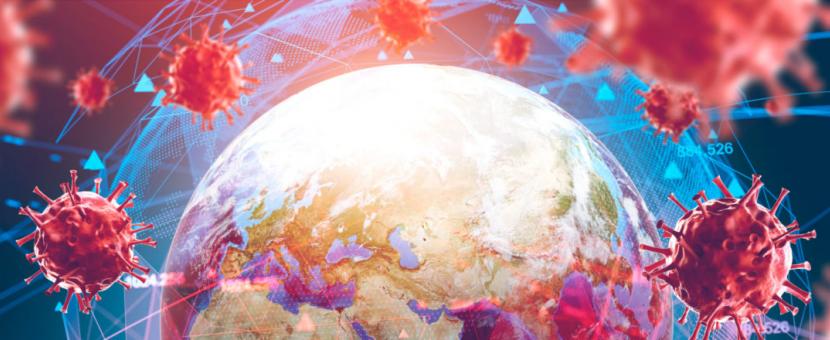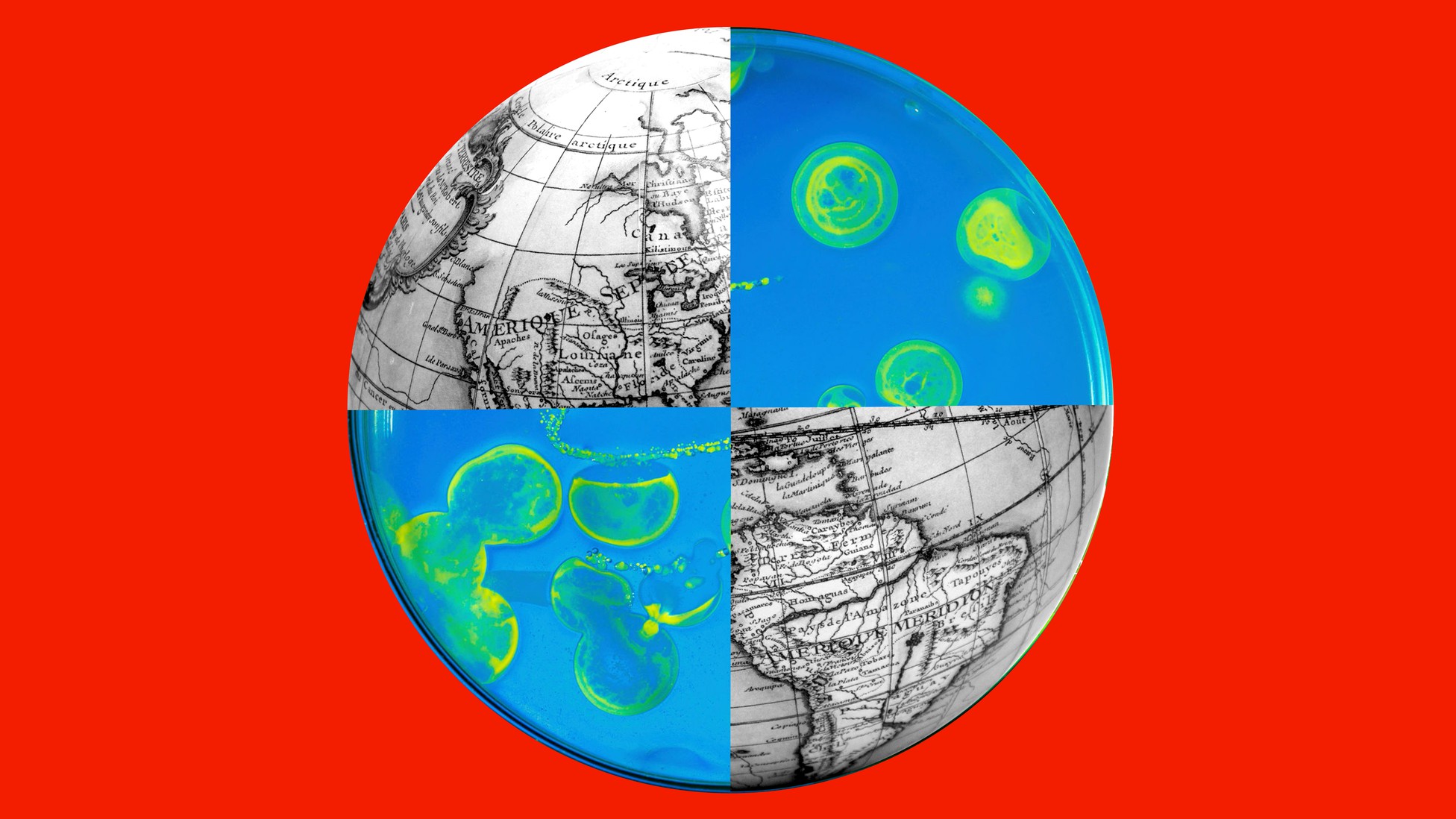‘The Wuhan lab leak theory is more about politics than science.’
‘Environmental Degradation as the Origin of the Current Pandemic.’
‘The climate crisis is still raging. A year ago, news headlines were dominated by the climate youth movement and a sense of urgency. But COVID-19 has displaced that interest and awareness. In fact, the causes of both crises share commonalities, and their effects are converging. The climate emergency and COVID-19, a zoonotic disease, are both borne of human activity that has led to environmental degradation. Neither the climate emergency nor a zoonotic pandemic were unexpected. Both have led to the preventable loss of lives through actions that are delayed, insufficient, or mistaken. However, aligning responses presents an opportunity to improve public health, create a sustainable economic future, and better protect the planet's remaining natural resources and biodiversity…’- THE LANCET

Photo: EDHEC Business School
‘In the last century, about half of the emerging infectious diseases of zoonotic origin resulted from changes in land use, agricultural practices and food production to respond to such demands...
‘We should not forget that the origins of this pandemic, as well as the origins of the greatest risks acknowledged in the current Global Risks Report, are related to environmental degradation...’-Cristina O'callaghan, ISGlobal, Barcelona Institute for Global Health
‘While the origin of the outbreak and its transmission pathway are yet to be asserted, we know diseases passed from animals to humans (zoonotic diseases) are on the rise, as the world continues to see unprecedented destruction of wild habitats by human activity. “Nature is sending us a message with the coronavirus pandemic and the ongoing climate crisis” according to the UN’s environment chief, Inger Andersen and other environmental experts.
‘According to an IPBES report released in October 2020, future pandemics will emerge more often, spread more rapidly, do more damage to the world economy and kill more people than COVID-19 unless there is a transformative change in the global approach to dealing with infectious diseases. The same human activities that drive climate change and biodiversity loss also drive pandemic risk through their impacts on our environment. Changes in the way we use land; the expansion and intensification of agriculture; and unsustainable trade, production and consumption disrupt nature and increase contact between wildlife, livestock, pathogens and people…’- Continue to read
‘The Wuhan lab leak theory is more about politics than science.’
By Robin McKie, Via The Observer
‘Whatever this week’s Biden review finds, the cause of the pandemic lies in the destruction of animal habitats.’

Photo: Adam Maida / The Atlantic / Science Photo Library / Gett
...“I think there is very strong evidence for this being caused by natural spillovers but that argument simply does not suit some political groups. They promote the idea that Covid-19 was caused by a lab leak because such a claim deflects attention from increasing evidence that indicates biodiversity loss, deforestation and wildlife trade – which increase the dangers of natural spillovers – are the real dangers that we face from pandemics.”-Professor James Wood, Cambridge University
‘In other words, fiddling with viruses in laboratories is not the dangerous activity. The real threat comes from the wildlife trade, bulldozing rainforests and clearing wildernesses to provide land for farms and to gain access to mines. As vegetation and wildlife are destroyed, countless species of viruses and the bacteria they host are set loose to seek new hosts, such as humans and domestic livestock. This has happened with HIV, Sars and very probably Covid-19.’- Robin McKie, Via The Observer
'Tip of the iceberg': is our destruction of nature responsible for Covid-19?'
By John Vidal, Via The Guardian
'As habitat and biodiversity loss increase globally, the coronavirus outbreak may be just the beginning of mass pandemics'
…’“There’s misapprehension among scientists and the public that natural ecosystems are the source of threats to ourselves. It’s a mistake. Nature poses threats, it is true, but it’s human activities that do the real damage. The health risks in a natural environment can be made much worse when we interfere with it,” -Richard Ostfeld, distinguished senior scientist at the Cary Institute of Ecosystem Studies in Millbrook, New York.
'Ostfeld points to rats and bats, which are strongly linked with the direct and indirect spread of zoonotic diseases. “Rodents and some bats thrive when we disrupt natural habitats. They are the most likely to promote transmissions [of pathogens]. The more we disturb the forests and habitats the more danger we are in,” ...
‘Felicia Keesing, professor of biology at Bard College, New York, studies how environmental changes influence the probability that humans will be exposed to infectious diseases. “When we erode biodiversity, we see a proliferation of the species most likely to transmit new diseases to us, but there’s also good evidence that those same species are the best hosts for existing diseases,” she wrote in an email to Ensia, the nonprofit media outlet that reports on our changing planet…’- Continue to read
‘After the COVID-19 crisis we should adopt a planetary health approach: protecting the
environment is an essential strategy for avoiding other major health crises.’-Cristina O'callaghan
A selection of related readings from our GCGI archives

Tarn Reflection, Mt Taranaki/Egmont, Egmont National Park, NZ.-Dave Young, Creative Commons
Why Love, Trust, Respect and Gratitude Trumps Economics
Nature the Best Teacher: Re-Connecting the World’s Children with Nature …
On the 250th Birthday of William Wordsworth Let Nature be our Wisest Teacher …
Season of Creation: Walking Together, Sowing Seeds of Hope
4000 Weeks To Live: Let's Live it Well
Slow Food for the Common Good to save the World
Sustainable Development Goals: Where is the Common Good?
Do we love the world enough to look after it, to save it?
‘Nature and Me’: A Beautiful and Inspiring Path to repair our relationship with life
‘Nature and Me’: Realigning and Reconnecting with Mother Nature’s Wisdom- A Five Part Guide
Detaching Nature from Economics is ‘Burning the Library of Life’
